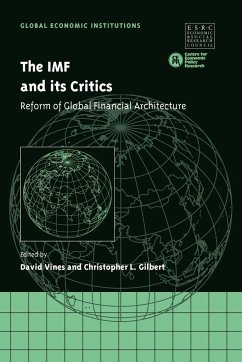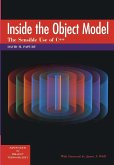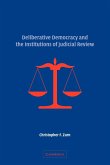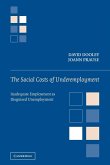The IMF and Its Critics
Reform of Global Financial Architecture
Herausgeber: Vines, David; Gilbert, Christopher L.
The IMF and Its Critics
Reform of Global Financial Architecture
Herausgeber: Vines, David; Gilbert, Christopher L.
- Broschiertes Buch
- Merkliste
- Auf die Merkliste
- Bewerten Bewerten
- Teilen
- Produkt teilen
- Produkterinnerung
- Produkterinnerung
An essential reference for anyone interested in the role of international financial institutions in our globalised economy.
Andere Kunden interessierten sich auch für
![Modernism and the Culture of Market Society Modernism and the Culture of Market Society]() John Xiros CooperModernism and the Culture of Market Society40,99 €
John Xiros CooperModernism and the Culture of Market Society40,99 €![Philosophical History and the Problem of Consciousness Philosophical History and the Problem of Consciousness]() Paul M. LivingstonPhilosophical History and the Problem of Consciousness50,99 €
Paul M. LivingstonPhilosophical History and the Problem of Consciousness50,99 €![Inside the Object Model Inside the Object Model]() David M. PapurtInside the Object Model87,99 €
David M. PapurtInside the Object Model87,99 €![Deliberative Democracy and the Institutions of Judicial Review Deliberative Democracy and the Institutions of Judicial Review]() Christopher F. ZurnDeliberative Democracy and the Institutions of Judicial Review62,99 €
Christopher F. ZurnDeliberative Democracy and the Institutions of Judicial Review62,99 €![The Social Costs of Underemployment The Social Costs of Underemployment]() David DooleyThe Social Costs of Underemployment40,99 €
David DooleyThe Social Costs of Underemployment40,99 €![The Evolution of Population Biology The Evolution of Population Biology]() The Evolution of Population Biology65,99 €
The Evolution of Population Biology65,99 €![Formal Methods in Human-Computer Interaction Formal Methods in Human-Computer Interaction]() Formal Methods in Human-Computer Interaction66,99 €
Formal Methods in Human-Computer Interaction66,99 €-
-
-
An essential reference for anyone interested in the role of international financial institutions in our globalised economy.
Hinweis: Dieser Artikel kann nur an eine deutsche Lieferadresse ausgeliefert werden.
Hinweis: Dieser Artikel kann nur an eine deutsche Lieferadresse ausgeliefert werden.
Produktdetails
- Produktdetails
- Verlag: Cambridge University Press
- Seitenzahl: 472
- Erscheinungstermin: 30. September 2008
- Englisch
- Abmessung: 229mm x 152mm x 28mm
- Gewicht: 760g
- ISBN-13: 9780521100502
- ISBN-10: 052110050X
- Artikelnr.: 25585193
- Herstellerkennzeichnung
- Libri GmbH
- Europaallee 1
- 36244 Bad Hersfeld
- gpsr@libri.de
- Verlag: Cambridge University Press
- Seitenzahl: 472
- Erscheinungstermin: 30. September 2008
- Englisch
- Abmessung: 229mm x 152mm x 28mm
- Gewicht: 760g
- ISBN-13: 9780521100502
- ISBN-10: 052110050X
- Artikelnr.: 25585193
- Herstellerkennzeichnung
- Libri GmbH
- Europaallee 1
- 36244 Bad Hersfeld
- gpsr@libri.de
Introduction; 1. The IMF and international financial architecture: solvency
and liquidity Christopher L. Gilbert, David Vines; 2. Progress towards
greater international financial stability Andrew Crockett; 3. International
coordination of macroeconomic policies: still alive in the new millennium?
Lawrence H. Meyer, Brian M. Doyle, Joseph E. Gagnon, Dale W. Henderson; 4.
The Report of the International Financial Institution Advisory Commission:
comments on the critics Allan H. Meltzer; 5. Reforming the global financial
architecture: just tinkering around the edges? Malcolm Knight, Lawrence
Schembri, James Powell; 6. The IMF and capital account liberalisation
Dominic Wilson; 7. How should the IMF view capital controls? Gregor Irwin,
Christopher L. Gilbert, David Vines; 8. The resolution of international
financial crises: an alternative framework Andrew G. Haldane, Mark Kruger;
9. Whose programme is it? Policy ownership and conditional lending James M.
Boughton, Alex Mourmouras; 10. The IMF and East Asia: a changing regional
financial architecture Gordon de Brouwer; 11. The role of the IMF in
developing countries Graham Bird, Paul Mosley; 12. Argentina and the Fund:
anatomy of a policy failure Michael Mussa; 13. Countries in payments'
difficulties: what can the IMF do? Andrew Powell; 14. Accountability,
governance and the reform of the IMF Ngaire Woods; 15. The IMF at the start
of the twenty-first century: what has been learned? On which values can we
establish a humanised globalisation? Michel Camdessus; Index.
and liquidity Christopher L. Gilbert, David Vines; 2. Progress towards
greater international financial stability Andrew Crockett; 3. International
coordination of macroeconomic policies: still alive in the new millennium?
Lawrence H. Meyer, Brian M. Doyle, Joseph E. Gagnon, Dale W. Henderson; 4.
The Report of the International Financial Institution Advisory Commission:
comments on the critics Allan H. Meltzer; 5. Reforming the global financial
architecture: just tinkering around the edges? Malcolm Knight, Lawrence
Schembri, James Powell; 6. The IMF and capital account liberalisation
Dominic Wilson; 7. How should the IMF view capital controls? Gregor Irwin,
Christopher L. Gilbert, David Vines; 8. The resolution of international
financial crises: an alternative framework Andrew G. Haldane, Mark Kruger;
9. Whose programme is it? Policy ownership and conditional lending James M.
Boughton, Alex Mourmouras; 10. The IMF and East Asia: a changing regional
financial architecture Gordon de Brouwer; 11. The role of the IMF in
developing countries Graham Bird, Paul Mosley; 12. Argentina and the Fund:
anatomy of a policy failure Michael Mussa; 13. Countries in payments'
difficulties: what can the IMF do? Andrew Powell; 14. Accountability,
governance and the reform of the IMF Ngaire Woods; 15. The IMF at the start
of the twenty-first century: what has been learned? On which values can we
establish a humanised globalisation? Michel Camdessus; Index.
Introduction; 1. The IMF and international financial architecture: solvency
and liquidity Christopher L. Gilbert, David Vines; 2. Progress towards
greater international financial stability Andrew Crockett; 3. International
coordination of macroeconomic policies: still alive in the new millennium?
Lawrence H. Meyer, Brian M. Doyle, Joseph E. Gagnon, Dale W. Henderson; 4.
The Report of the International Financial Institution Advisory Commission:
comments on the critics Allan H. Meltzer; 5. Reforming the global financial
architecture: just tinkering around the edges? Malcolm Knight, Lawrence
Schembri, James Powell; 6. The IMF and capital account liberalisation
Dominic Wilson; 7. How should the IMF view capital controls? Gregor Irwin,
Christopher L. Gilbert, David Vines; 8. The resolution of international
financial crises: an alternative framework Andrew G. Haldane, Mark Kruger;
9. Whose programme is it? Policy ownership and conditional lending James M.
Boughton, Alex Mourmouras; 10. The IMF and East Asia: a changing regional
financial architecture Gordon de Brouwer; 11. The role of the IMF in
developing countries Graham Bird, Paul Mosley; 12. Argentina and the Fund:
anatomy of a policy failure Michael Mussa; 13. Countries in payments'
difficulties: what can the IMF do? Andrew Powell; 14. Accountability,
governance and the reform of the IMF Ngaire Woods; 15. The IMF at the start
of the twenty-first century: what has been learned? On which values can we
establish a humanised globalisation? Michel Camdessus; Index.
and liquidity Christopher L. Gilbert, David Vines; 2. Progress towards
greater international financial stability Andrew Crockett; 3. International
coordination of macroeconomic policies: still alive in the new millennium?
Lawrence H. Meyer, Brian M. Doyle, Joseph E. Gagnon, Dale W. Henderson; 4.
The Report of the International Financial Institution Advisory Commission:
comments on the critics Allan H. Meltzer; 5. Reforming the global financial
architecture: just tinkering around the edges? Malcolm Knight, Lawrence
Schembri, James Powell; 6. The IMF and capital account liberalisation
Dominic Wilson; 7. How should the IMF view capital controls? Gregor Irwin,
Christopher L. Gilbert, David Vines; 8. The resolution of international
financial crises: an alternative framework Andrew G. Haldane, Mark Kruger;
9. Whose programme is it? Policy ownership and conditional lending James M.
Boughton, Alex Mourmouras; 10. The IMF and East Asia: a changing regional
financial architecture Gordon de Brouwer; 11. The role of the IMF in
developing countries Graham Bird, Paul Mosley; 12. Argentina and the Fund:
anatomy of a policy failure Michael Mussa; 13. Countries in payments'
difficulties: what can the IMF do? Andrew Powell; 14. Accountability,
governance and the reform of the IMF Ngaire Woods; 15. The IMF at the start
of the twenty-first century: what has been learned? On which values can we
establish a humanised globalisation? Michel Camdessus; Index.








